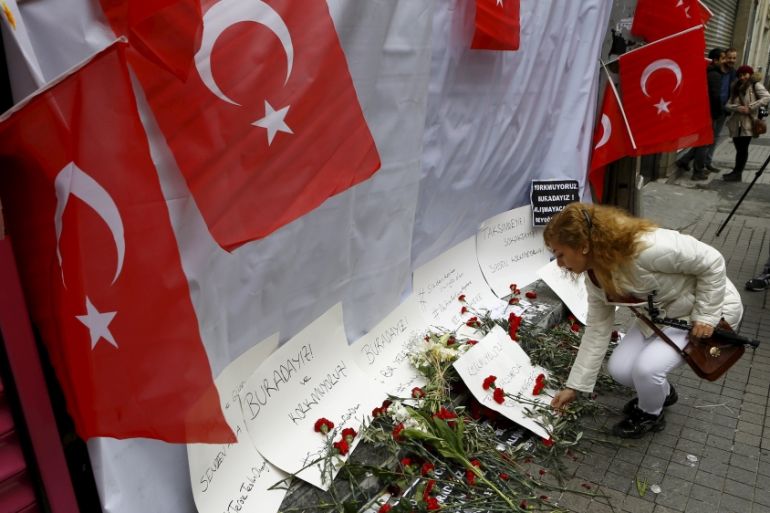Suicide blast shakes Istanbul’s tourist hub
People in Turkish capital are nervous yet defiant as yet another deadly blast hits the country.

The suicide blast at Istiklal Street at the heart of Istanbul was not big.
I was at the site and the destruction was not huge compared with other blasts that have hit Turkey in the recent past.
Keep reading
list of 4 itemsMoscow theatre attack suspects show signs of beating in court
Four men showing signs of severe beating charged over Moscow concert attack
Russia mourns Moscow concert hall attack victims as death toll rises to 137
I saw few windows shattered. I saw several holes caused by shrapnel and that was about it.
But what this attack did or achieved is that it left a deep scar and instilled deep fear and worry among people.
I stood watching the peoples’ reaction when they passed the explosion site.
A man wearing his chef clothing seemed in total disbelief as he gazed at what became the memorial site.
People laid down flowers at the site in Istanbul’s bustling tourist hub.
There were also banners and written messages. “We are not going anywhere,” read one.
“We won’t give in to terrorism,” read the other.
It’s true that those messages seem to reflect a sense of defiance.
‘People concerned’
But let’s be clear, the attack made a lot of people nervous and concerned.
One woman was close to tears when she walked past the site.
Another woman told me through a translator that everyone in Istanbul now is a suspect.
“Istanbul has millions of people living here. And millions of foreigners come here … after this attack I fear anybody could do anything… and everyone could be a suspect,” she said.
Turkey has been rocked by a number of suicide explosions and bombings since July last year. Since the beginning of the year, Turkey has already been hit by four attacks, including two this month.
It’s clear that there is a pattern here to hit Turkey’s security and economy.
The suspects or the perpetrators belong to Islamic State of Iraq and the Levant (ISIL, also known as ISIS), the Kurdistan Worker’s Party (PKK) or any of its affiliated groups.
The government says the country is safe. Well, they need to do more to calm down the fears of its citizens and the tens of millions of foreigners that contribute to its economy.